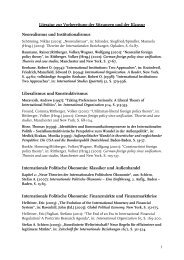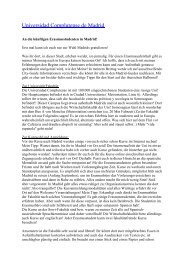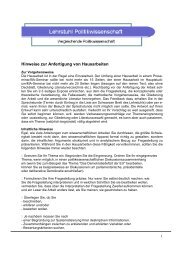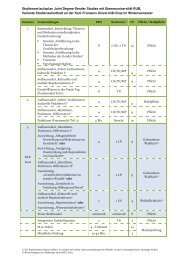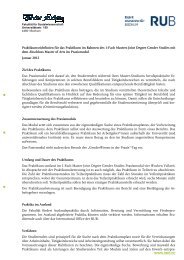View - Fakultät für Sozialwissenschaft der Ruhr-Universität Bochum
View - Fakultät für Sozialwissenschaft der Ruhr-Universität Bochum
View - Fakultät für Sozialwissenschaft der Ruhr-Universität Bochum
You also want an ePaper? Increase the reach of your titles
YUMPU automatically turns print PDFs into web optimized ePapers that Google loves.
Wilkesmann/Rascher self-governance and slowness page 13<br />
2.1.2 External intervention<br />
The management can intervene in the prisoner’s dilemma as a third actor. It might reward the<br />
cooperative strategy with an extra bonus X. The rewards for the cooperative strategy will be<br />
changed like this (fig. 2):<br />
employee II<br />
employee I puts in does not put in<br />
puts in R + X / R + X S + X / T<br />
does not put in T / S + X P / P<br />
Fig. 2: PD of storage knowledge in a database with external intervention<br />
The cooperative strategy will be dominant individually, if X ≥ T – R. And if X is added to the<br />
rewards R and S, an or<strong>der</strong> of rewards can be established: R > T > S > P. It is a mix of<br />
assurance and chicken game.<br />
In the company’s point of view it is also efficient to award a bonus, because the dilemma is<br />
overcome and all employees put their data in the database. The function of storage and<br />
exchange of data is fulfilled. The company does not reinvent the wheel. Knowledge is there,<br />
where it is needed. Not only the contributor ("giver of knowledge") has to be rewarded but<br />
also the re-user ("taker of knowledge"; see Gibbert/Jonczyk/Völpel 2000). The evaluation and<br />
monitoring process can be constructed in analogy to the evaluation process of the well-known<br />
internet auction company E-Bay.<br />
External rewards 9 could be books, mobile phones, and days off. But there are some problems<br />
with such selective incentives:<br />
1. They might produce a cycle of expectations (see Frey/Osterloh 2002). If I receive a<br />
reward of Z this year, I will expect a reward of Z + X next year.<br />
2. The problem of multi-tasking: "If a company pays its employees on the basis of<br />
certain targets which have to be achieved (e.g. sales and customer satisfaction) and the<br />
targets in question are different to a certain extent, as it is either easy or difficult to<br />
measure them (for instance, sales can be measured more easily and clearly than<br />
customer satisfaction), then extrinsically motivated employees will concentrate on<br />
9<br />
"Conversely, behavior is extrinsic when the means (action) and the ends (action goals) are<br />
thematically incongruent; when the goal is thematically different, and the action and its<br />
outcome constitute a means for bringing about a different kind of goal. The means<br />
character is merely external and essentially arbitrarily selected. For example, aggression<br />
is extrinsic if one attacks people not to do injury (that would be intrinsic) but to rob them.<br />
Aggression research calls this "instrumental" aggression, which should not be confused<br />
with actual (i.e., in our terms, intrinsic) aggression." (Heckhausen 1991: 406)<br />
13



